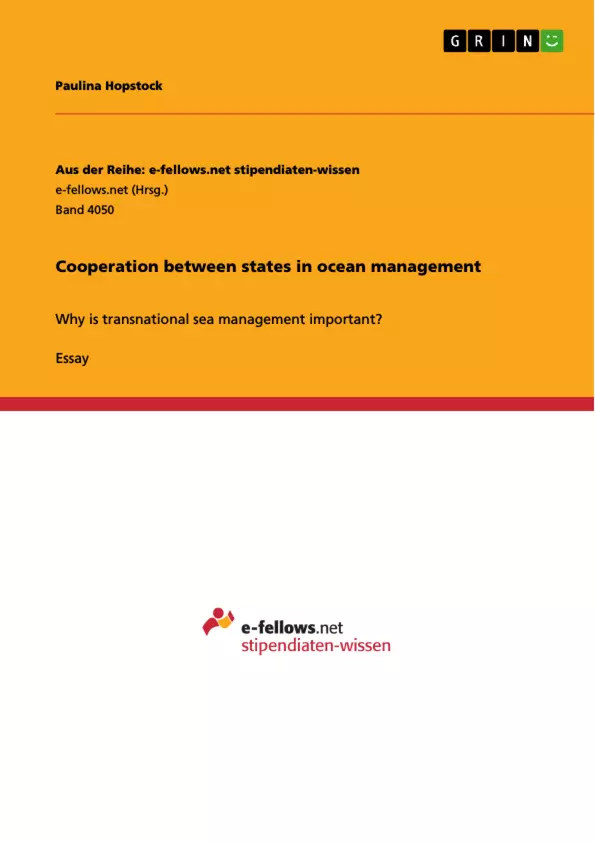It is easy to draw a border on a map. It is easy for a state to keep to its own side of the border – so long as activities on land are concerned. But when activities at sea enter the equation, it is not as simple anymore. Overall, there are only 44 landlocked countries that have no immediate access to open water, so the question of how to manage the oceans is of high importance to nearly every state in the world.
Often, man-made and natural borders do not match. Especially at sea, biophysical borders are more porous than they are on land, so the effects of human activities are not limited to the particular area in which they take place . Spill-over effects from marine activities are common, specifically among neighboring countries. This may result in conflicts between different stakeholders that need to be solved at an international level. Because of this, when managing sea spaces, transnational coordination plays a key role.
Inhaltsverzeichnis (Table of Contents)
- Transnational sea management: Why and how?
- The importance of cooperative sea management
- Protection and conservation of the sea
- Avoiding conflicts
- Tools for cooperative sea management
- Collaboration mechanisms within the EU: MSP Directive
- Example: The Baltic Sea
- Conclusion
Zielsetzung und Themenschwerpunkte (Objectives and Key Themes)
This paper examines the importance of cooperative sea management and explores the tools and mechanisms available for implementing such collaboration. The paper focuses on the need for international cooperation in addressing challenges related to ocean management, particularly the protection and conservation of marine environments and the avoidance of conflicts between stakeholders.
- The importance of cooperative sea management for effective ocean protection and conservation
- Challenges of managing marine activities across national boundaries
- The role of transnational coordination in resolving conflicts and achieving sustainable ocean use
- Examples of successful collaborative sea management initiatives
- The legal framework for international cooperation in ocean management
Zusammenfassung der Kapitel (Chapter Summaries)
This section provides a brief overview of the key points covered in each chapter, excluding the conclusion and final chapter.
- Transnational sea management: Why and how? This chapter introduces the concept of transnational sea management and emphasizes the importance of international cooperation for effective ocean management. It highlights the challenges of managing marine activities across national boundaries and the need for a coordinated approach to address these challenges.
- The importance of cooperative sea management This chapter delves into the specific reasons why cooperative management is crucial for ocean conservation. It explores the impact of human activities on marine ecosystems, particularly concerning pollution and biodiversity loss, and underscores the need for international collaboration to mitigate these impacts.
- Protection and conservation of the sea This chapter further examines the need for international cooperation in protecting and conserving marine environments. It highlights the legal obligations of states to respect the environment of other states and the importance of preventative measures to avoid environmental damage.
- Avoiding conflicts This chapter addresses the potential for conflicts arising from competing interests in ocean management. It explores the need for a coordinated approach to resolve these conflicts and ensure the sustainable use of ocean resources.
- Tools for cooperative sea management This chapter introduces various tools and mechanisms that can facilitate cooperative sea management, with a particular focus on the EU's Maritime Spatial Planning Directive.
- Collaboration mechanisms within the EU: MSP Directive This chapter provides an in-depth analysis of the EU's Maritime Spatial Planning Directive, highlighting its role in promoting coordinated and sustainable ocean management within the European Union.
- Example: The Baltic Sea This chapter presents a case study of the Baltic Sea, illustrating how collaborative sea management is being implemented in this region.
Schlüsselwörter (Keywords)
The key themes and focus topics explored in this paper include cooperative sea management, transnational coordination, ocean conservation, marine biodiversity, environmental pollution, international law, maritime spatial planning, and the Baltic Sea. These terms encapsulate the core concepts and research focus of the work.
Frequently Asked Questions
Why is transnational cooperation necessary for ocean management?
Marine borders are porous, and activities in one state's waters (like pollution) often affect neighboring countries. Cooperation is essential to protect ecosystems and avoid conflicts between stakeholders.
What is the EU MSP Directive?
The Maritime Spatial Planning (MSP) Directive is a framework within the European Union that requires member states to coordinate their activities at sea to achieve sustainable growth and environmental protection.
How does cooperative management help avoid conflicts?
By establishing transnational coordination mechanisms, states can resolve competing interests between sectors like fishing, shipping, and energy production before they lead to international disputes.
What is a practical example of collaborative sea management?
The Baltic Sea serves as a case study where neighboring countries work together on environmental protection and spatial planning due to the shared and sensitive nature of the marine environment.
Do landlocked countries have an interest in ocean management?
Yes, although 44 countries are landlocked, ocean management is globally important due to trade, climate impacts, and international law that governs shared marine resources.
- Citar trabajo
- Paulina Hopstock (Autor), 2021, Cooperation between states in ocean management, Múnich, GRIN Verlag, https://www.grin.com/document/1161278



